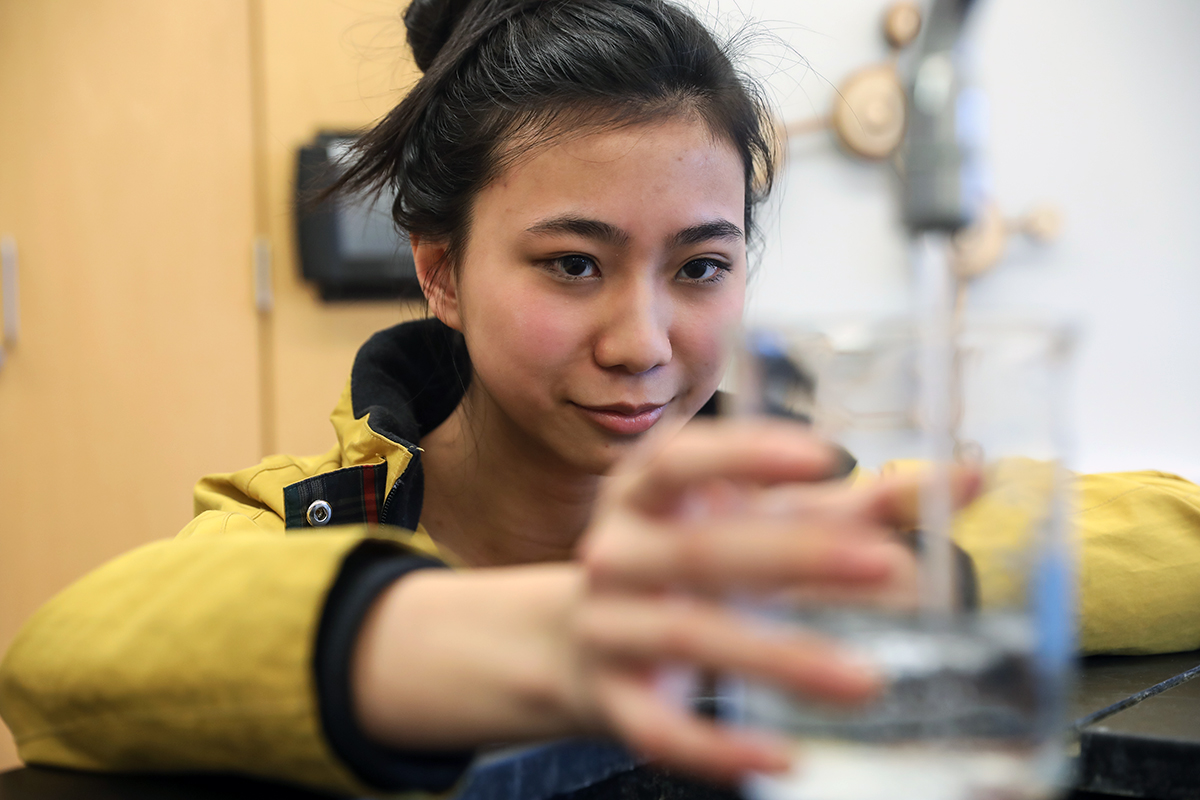Lucy Sun

Water. The most plentiful compound on Earth. Vital to every human’s survival. And Lucy Sun’s intellectual preoccupation.
The senior has spent the past three years working toward solving a worldwide worry — access to clean drinking water. “I want to be able to bring innovation from the lab into the household,” Sun says. “My goal is to make a consumer-based product, a portable water filter, like a Brita, with improved efficiency.”
Growing up in New York City, Sun says, she took water for granted. “We have really fresh water from the Catskills, but [at Exeter] we hear a lot about how the water is dangerous, don’t drink the tap water,” she says. “So, I was really curious about it and obviously, if it’s a health concern, I wanted to help address it.”
Something in the water?
As a start, Sun enrolled in a Green Umbrella Learning Lab class her lower year. “I worked with a group of students to try to get a new water disinfection system for the town of Exeter,” Sun says. Her class tested water all over campus and town and proved that much of it violated EPA standards and contained high levels of trihalomethanes, or THMs, which have been linked to increased risks of cancer and miscarriages. “Dr. [Jon] Sakata’s house had 90 parts per billion,” she says. “When you have a purifier, like in Bancroft, there was only 23 parts per billion. … But those are expensive.”
Sun approached Science Department Chair Alison Hobbie her upper year about pursuing an independent scientific project that would expand upon the work she had begun in her GULL class. Her idea: Design an affordable, chemistry-based water filtration system that would remove THMs and help communities struggling with contamination. With little chemistry training under her belt, this would be tough. “It was a lot of self-learning, self-teaching concepts, a lot of review,” Sun says.
Following some positive initial experiments, Sun applied to continue her research during her senior year. Hobbie agreed and offered her an office across the hall from her own as a supervised research base. Sun quickly found she needed access to more specialized equipment and arranged to work with chemistry, material science and environmental engineering professors in a lab at the University of New Hampshire.
Testing … testing …
Every week over winter term, Sun took the train from Exeter to Durham to test samples. The 30-hour workweek was a grind. “Being a scientist, it’s really tedious, because a lot of times you’re doing the same thing over and over again,” Sun says. “But seeing the results gets me excited. If they’re bad, I can get a little bit stressed out, but I think about how I can do better. That gives me the adrenaline. If I can see my project moving forward, if I can see its potential in society, I am very happy.”
Sun presented her results in the Sinha Room of the Phelps Science Center in March. She had indeed succeeded. Her new, photocatalytic filter system utilizes a novel titanium dioxide and activated carbon composite to not only remove fungi, bacteria, chloroform and THMs from water, but break down the pollutants into non-harmful components.
“The coolest part is not the low cost, or how to make money out of [the discovery],” says Science Instructor Tatiana Waterman. “But the fact that the harmful molecule is killed, Lucy killed it.”
Sun has applied for a provisional patent on her work that will protect it for a year. She is also planning to pursue an environmental science major in college. “I’ll always have this valuable environmentally conscious mindset going forward,” she says. “It’s something that I’ve taken from high school and will take with me for the rest of my life.”
— Jennifer Wagner


